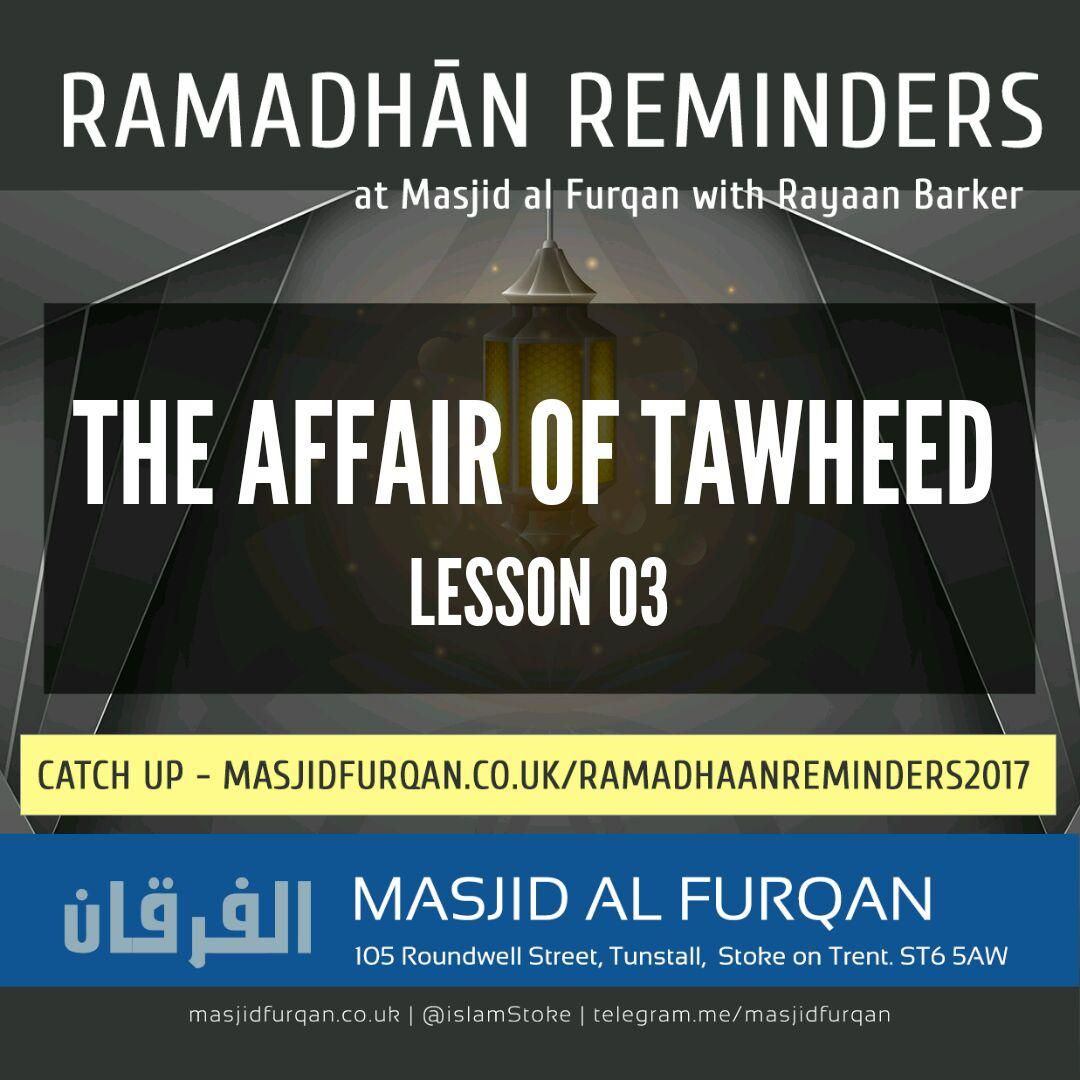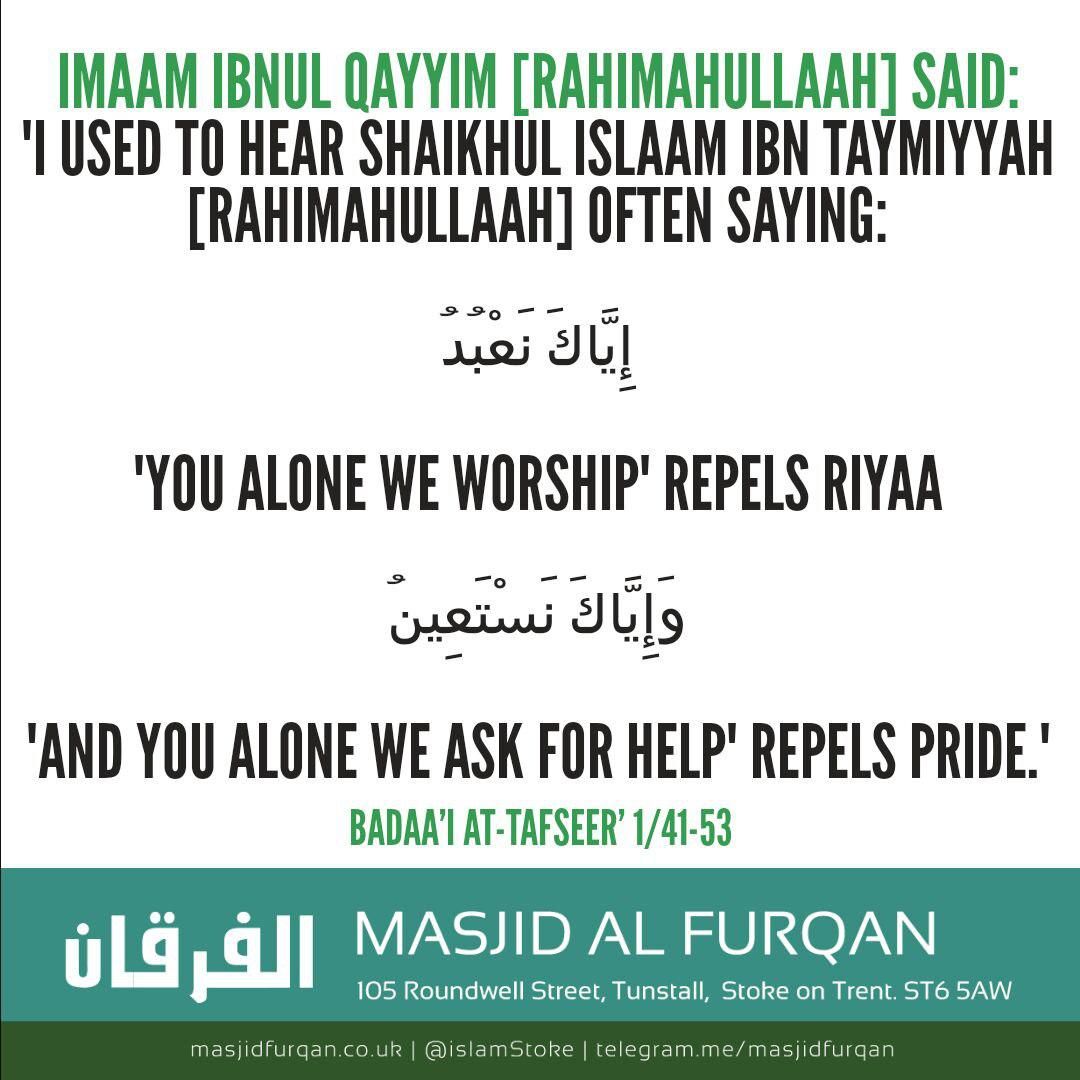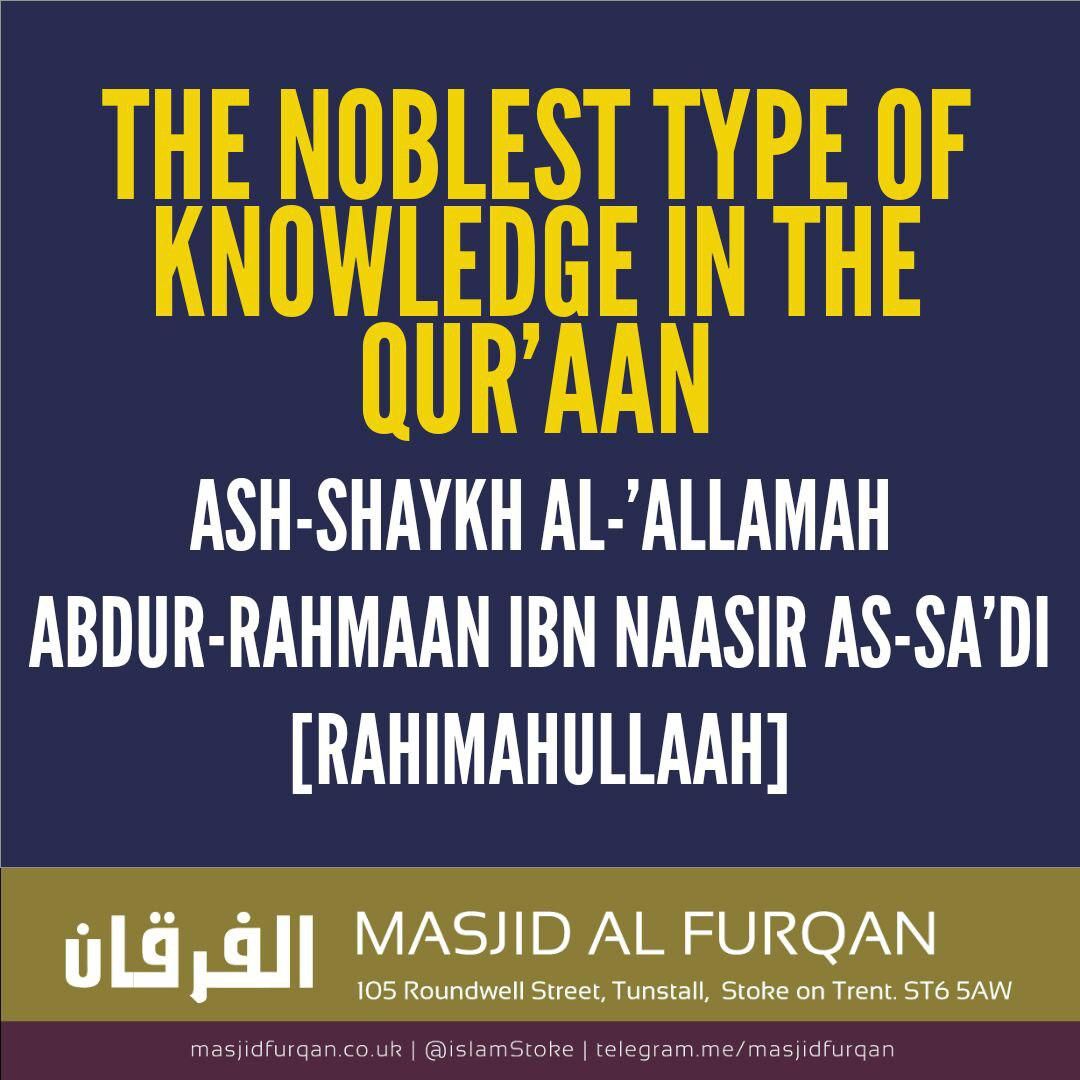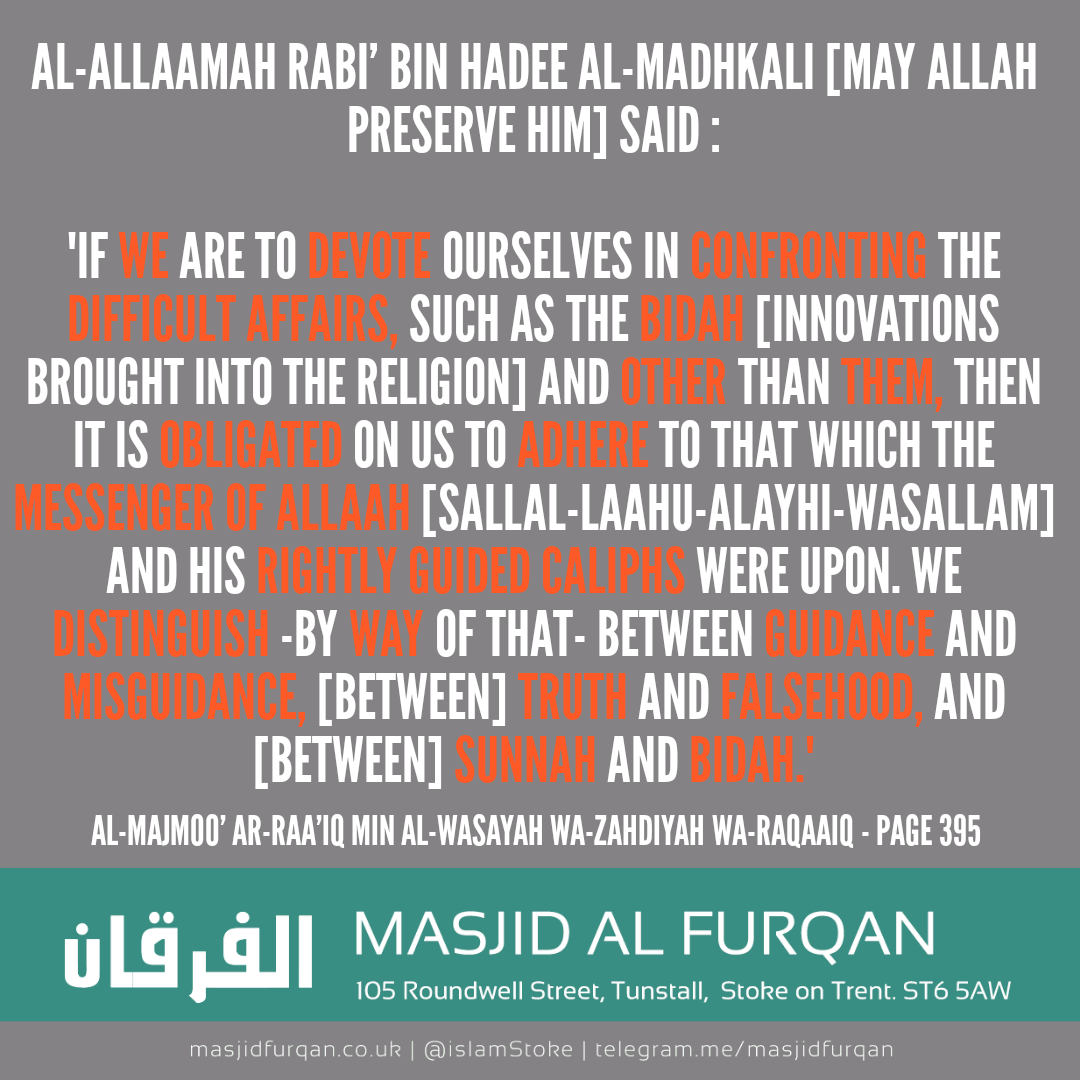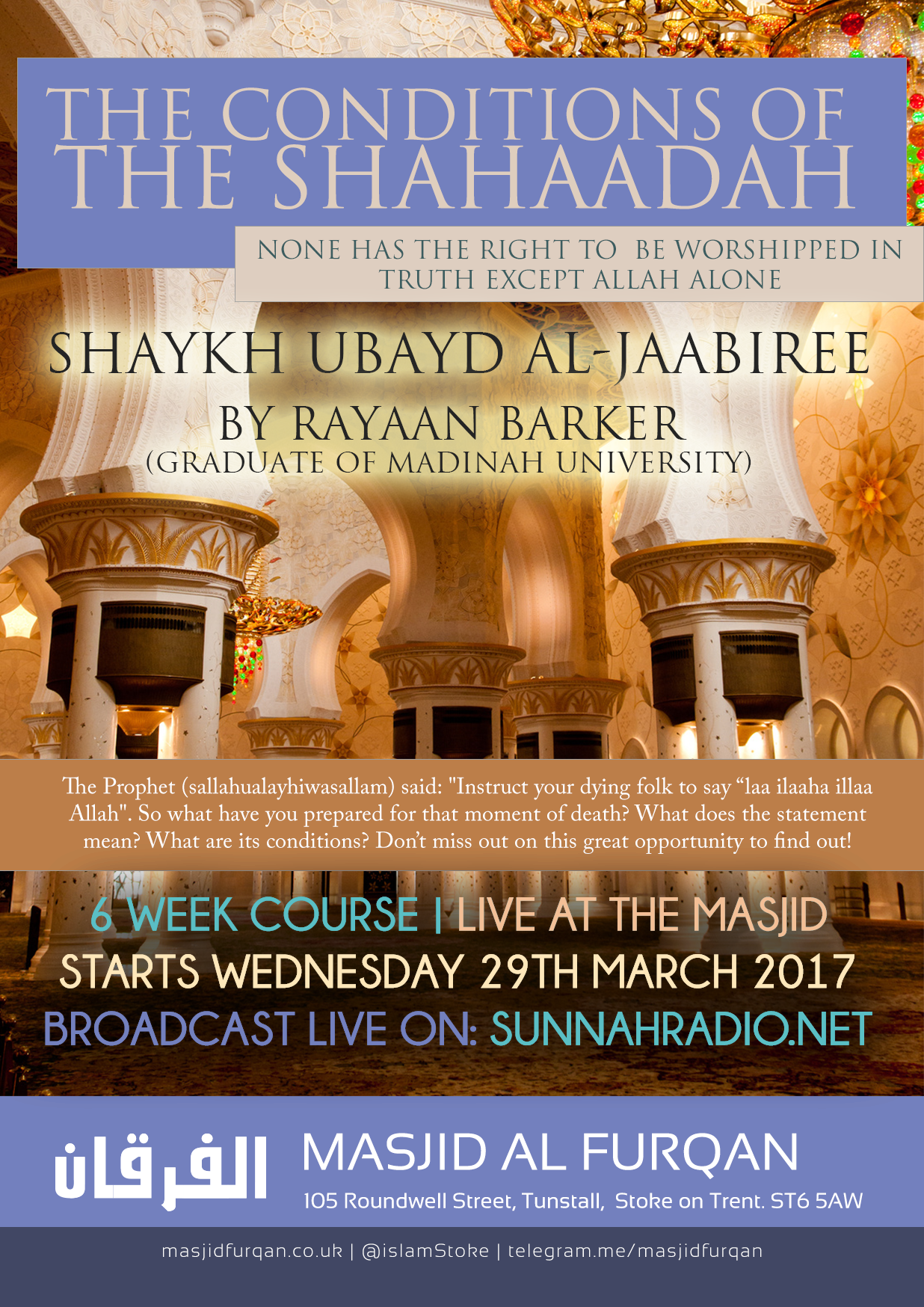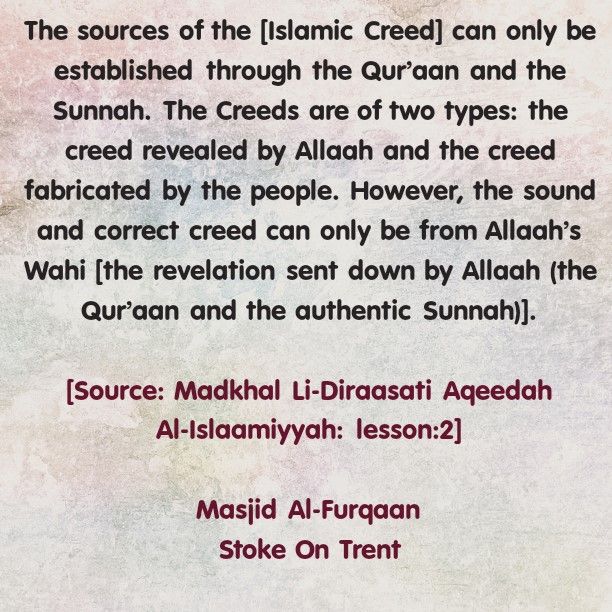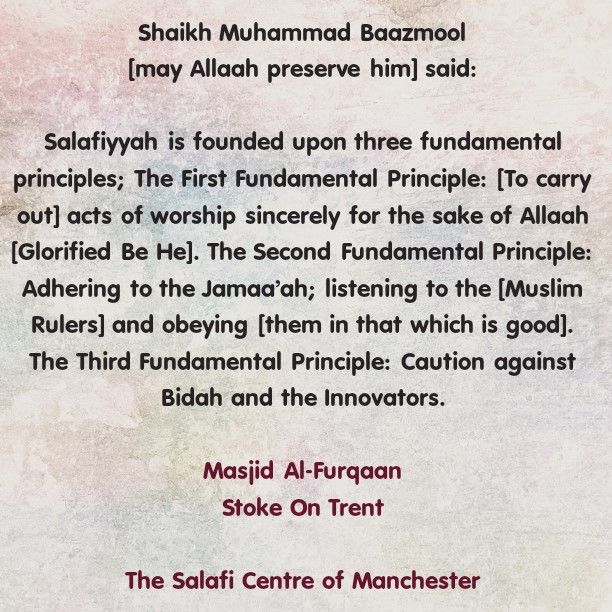Tag: tawheed
Among The Virtues Of The Prophet’s City | Shaykh Muhammad ibn Saalih al-‘Uthaymeen (Rahimahullah)
Written by Masjid Furqan on . Posted in Announcements, Articles, Belief - 'Aqeedah', Methodology - 'Manhaj', Monotheism - Tawheed, Scholars of Islam, Seeking Knowledge, The Salaf - Pious Predecessors, Worship - 'Ibaadah'.
Among The Virtues of The Prophet’s City- By Imaam Muhammad Ibn Saaleh Al-Uthaymeen (Rahimahullah)
Imaam Muhammad Bin Saaleh al-Uthaymeen (rahimahullaah) was asked about the statement of the Messenger (sallal-laahua-alayhi-wasallam) that: ‘’Verily Imaan returns and goes back to Madeenah as a snake returns and goes back to its hole.’’[1]
Answer:
In this hadeeth the Messenger (sallal-laahu-alayhi-wasallam) said: ‘’ Verily Imaan returns and goes back to Madeenah as a snake returns and goes back to its hole.’’ The word (يَأرِزُ)-Yarizo with a kasrah on the letter Raa can also have a Fatha or a Dammah (on the Raa). And the meaning of (يَأرِزُ) – Yarizo is that (Islaam) will return and it will be established in Madeenah, just as a snake returns to its hole after exiting it. This is an indication from the Prophet (sallal-laahu-alahi-wasallam) that this religion will return to Madeenah after the other lands become corrupted, just as a snake goes out and roams about in the earth, and then returns to its hole after that.
In this hadeeth is also an indication that just as Islaam did spread from Madeenah, it will also return to it; for indeed Islaam’s strength and authority did not spread except from Madeenah, even though its origin was in Makkah. Makkah was the first place where the revelation came down, but the Muslims were not able to establish a state, authority and Jihaad except after migrating to Madeenah. So for this reason, Islaam’s authority, enforcement and strength spread from Madeenah, and it will return to it in the end of time.
And some of the people of knowledge say that this (hadeeth) is indicative of an affair that has preceded, and that people did come to Madeenah and return to it in order to acquire the knowledge of the Sharee-ah and to study Islaam. However, the first meaning is what is apparent from the hadeeth. [2]
[1]Saheeh Bukhaari: Summarized Version: Hadeeth Number: 909
[Source:Fataawaa Fadeelatus Shaikh Al-Allaamah Muhammad Bin Saaleh Al-Uthaymeen Fil Aqeedah: Vol:1-2: page: 84-85]
“You Alone We Worship And You Alone We Ask For Help” | Imaam ibn-ul Qayyim (Rahimahullah)
Written by Masjid Furqan on . Posted in Articles, Belief - 'Aqeedah', Monotheism - Tawheed, Qur'aan, Scholars of Islam, Seeking Knowledge, The Salaf - Pious Predecessors, Worship - 'Ibaadah'.
Imaam Ibnul Qayyim [rahimahullaah] said: “
I used to hear Shaikhul Islaam Ibn Taymiyyah [rahimahullaah)] often saying:
[إِيَّاكَ نَعْبُدُ] – “You alone we worship” repels Riyaa
[ وَإِيَّاكَ نَسْتَعِينُ] – “And you alone we ask for help” repels Pride.”
Source: Badaa’i At-Tafseer’ 1/41-53
The Noblest Type of Knowledge In The Qur’aan | Ash-Shaykh al-‘Allamah Abdur-Rahmaan ibn Naasir as-Sa’di (Rahimahullah)
Written by Masjid Furqan on . Posted in Articles, Belief - 'Aqeedah', Methodology - 'Manhaj', Monotheism - Tawheed, Qur'aan, Scholars of Islam, Seeking Knowledge.
The Noblest Type of Knowledge In The Qur’aan
The knowledge of Tawheed is the noblest aspect of knowledge without exception. It is the most virtuous and perfect. By way of it the hearts are nurtured upon a sound creed. By way of it, moral character is purified and deeds are perfected. The subject matter of Tawheed is based on the following:
To study what is obligatory to affirm for Allaah regarding His perfect Attributes and lofty descriptions, and that which makes it impossible to either describe Allaah with deficient and blameworthy attributes, or likening Him to others.
To study that which establishes the fact that Allaah alone brought about all things into existence and that He does whatever He wills-whatever He wishes will take place and whatever he does not wish cannot take place.
Likewise, studying what is obligatory regarding belief in the Messengers, their qualities and the rights due to them, and what is forbidden with regards to violation of such rights.
Belief in the Books revealed to the Messengers and in that which Allaah has stated about Himself, and that which His Messengers stated regarding the events of the past and the future.
Belief in the last day, recompense, reward and punishment, the paradise and hell fire, and that which is stated and connected to these affairs.
These are the general affairs of this lofty affair of knowledge. Indeed the Qur’aan has explained these affairs with a profound explanation and clarified it in a manner that is not equal to [its explanation and clarification] in the other revealed books.
[Source: Fat-hul Raheem Al-Malikil Allaam Fee Ilmil Aqaa-id Wat-Tawheed Wal-Akhlaaq Wal-Ahkaam of Imaam Sadi (rahimahullaah). Page:7 Abridged & slightly paraphrased]
What Do We Utilise When Dealing With The Innovations? – Al-‘Allamah Shaikh Rabee ibn Haadee al-Madkhali (Hafithahullah)
Written by Masjid Furqan on . Posted in Articles, Belief - 'Aqeedah', Methodology - 'Manhaj', Scholars of Islam, Seeking Knowledge, The Salaf - Pious Predecessors, Worship - 'Ibaadah'.
Al-Allaamah Rabi’ Bin Hadee Al-Madhkali [May Allah preserve him] said :
“If we are to devote ourselves in confronting the difficult affairs, such as the bid’ah [innovations brought into the religion] and other than them, then it is obligated on us to adhere to that which the Messenger of Allaah [sallal-laahu-alayhi-wasallam] and his rightly guided Caliphs were upon. We distinguish -by way of that- between guidance and misguidance, [between] truth and falsehood, and [between] Sunnah and bidah.
Al-Majmoo Ar-Ra’iq Min Al-Wasayah Wazahdiyah Waraqaaiq – page 395
The Main Reason Munaafiqoon Are Rebuked – By Imaam Ibnul Qayyim
Written by Masjid Furqan on . Posted in Belief - 'Aqeedah', Deviated Groups, Sects and Parties, Monotheism - Tawheed, Purification of The Soul, Worship - 'Ibaadah'.
Imaam Ibnul Qayyim [rahimahullaah] said:
If deeds were of benefit without sincerity, the hypocrites would not have been rebuked.
[الفوائد- page: 65]
The Conditions of The Shahaadah | Rayaan Barker
Written by Masjid Furqan on . Posted in Announcements, Events, Lessons.
Explanation of ash-Shaykh al’Allamah Ubayd ibn Abdillah al-Jaabiree (Hafithahullah)
Read by Rayaan Barker (Graduate of Madinah University)
Lesson 1
The Statement of Laa illaha illah – is the Key to Paradise.
The Shahaadah is the foundation of al-Islaam, it is the first Pillar of islaam
Abdullah ibn Umar said:
“Islaam is built upon five things, The testification to Laa ilaa ha ilal Allah and that Muhammad is the Messenger of Allah…”
So the virtue of the Shahaadah is indeed great and lofty, it enters people into islaam
The Prophet, peace be upon him, said:
“The best statement that I and all of the other Prophets have said is the testification of Laa ilaha illalah, to him belongs the dominion, to Him belongs all praise…”
The Prophet sent Mu’aadh ibn jabal to Yemen and instructed him to call the People of the Book to firstly Laa ilaha ilallah and is from the first of affairs in Islaam, it is the first matter a person calls to when giving Da’wah
The Prophet likewise instructed the dying folk to say Laa ilaa ha ilallah
It is from the highest part of Eemaan. Eemaan increases and decreases as Ahlus Sunnah believe
The Prophet said:
“Eeman has 70 odd branches and from the highest part of it is Laa ilaaha illalah”
It was said to Wahb ibn Munnabih:
Isn’t Laa ilaaha illalah the key to jannah? He said:
“Indeed it is, however every key has teeth, so if you come with the key with the correct teeth then the door will open for you however if you do not have the correct key the door wil not open for you”
Thus if you come on the Day of Judgement with the Shahaadah fulfilling all of it’s conditions then you will be successful Inshaa’Allah. The Shahaadah needs to be actualised throughout one’s life and for it to not merely be a statement upon one’s tongue
Lesson 2
In this lesson, Ustadh Rayaan hafidhahullaah discusses the second condition of the Shahaadah which is al Yaqeen.
-It is to have certainty about it’s meaning, to have complete knowledge about the Shahaadah which brings certainty and opposes doubt.
-Eemaan does not benefit an individual without certainty. An individual cannot have Conjecture, assumptions or presumptions about the Shahaadah.
-Allah subhaanahu wa Ta’aalah says in the Qur’aan in surah Al Hujuraat ayah 15:
“Indeed the believers are those that have believed in Allah and his Messenger and they do not have doubt..”
-If doubt clings to the foundation of Eemaan it opposes it. Thus certainty needs to be absolute.
Lesson 3
This audio starts with the condition of al-Ikhlaas (Sincerity) and also covers the condition of as-Sidq (Truthfulness). It is imperative for a Muslim to have sincerity so that all actions are performed sincerely for Allah’s sake alone and to negate all forms of Shirk.
Truthfulness is likewise important to ensure that a Muslims’s Testimony of Faith is actualized based upon him/her being true to it and acting upon all that it entails.
Lesson 4
In this lesson Ustaadh Rayaan discusses the fifth condition of the Shahaadah, al-Mahabah (Love), and the importance of a Muslim upholding this condition. It is imperative for one to love the Shahaadah and all that it commands and likewise it is important to hate all that it negates i.e. Shirk in all it’s forms.
Lesson 5
In this lesson, the last two conditions of the Shahaadah are discussed; al-Inqiyaad (Submission) and al-Qabool (Acceptance). Submission is regarding the outwardly actions just as an individual testifying to the Shahaadah and acting upon it and what it entails. Acceptance is related to the action of the heart and the Scholars have explained it in this manner.

Remember Allah at All Times
Written by Masjid Furqan on . Posted in Announcements, Belief - 'Aqeedah', Brotherhood, Calling To Islam - 'Da'wa', Monotheism - Tawheed, Morals and Manners - 'Akhlaaq', Purification of The Soul, Seeking Knowledge, Worship - 'Ibaadah'.
The Messenger (صلى الله عليه و سلم) said to his cousin, Abdullaah ibn `Abbaas) whilst he was still a youth, “O young boy, surely I will teach you some words” and then he began to teach Abdullaah ibn `Abbaas. He said to him:
“Be mindful of Allāh and he will protect you, be mindful of Allāh and you will find him in-front of you. If you ask than ask of Allāh, and know that if all the people were to gather together to benefit you with something, they could not benefit you except with that which Allāh has already written for you – and if they were to gather together to harm you with anything they would not be able to harm you except with that which Allāh has already written and decreed for you. Indeed the pens have been lifted and the pages have dried.”
(At-Tirmidhee)
An Introduction to the study of the Sound Islamic Creed
Written by Abdullah Jallow on . Posted in Belief - 'Aqeedah', Monotheism - Tawheed, Purification of The Soul, Worship - 'Ibaadah'.
In The Name of Allaah, The Most Merciful, The Bestower of mercy
The sources of the (Islamic Creed) can only be established through the Qur’aan and the Sunnah. The Creeds are of two types: (a) the creed revealed by Allaah and the creed fabricated by the people. However, the sound and correct creed can only be from Allaah’s Wahi [the revelation sent down by Allaah (the Qur’aan and the authentic Sunnah)]. Allaah (The Most High) informed us about Yoosuf (alayhis-salaam) and what said to his companions in the prison:
يَا صَاحِبَيِ السِّجْنِ أَأَرْبَابٌ مُتَفَرِّقُونَ خَيْرٌ أَمِ اللَّهُ الْوَاحِدُ الْقَهَّارُ; مَا تَعْبُدُونَ مِنْ دُونِهِ إِلَّا أَسْمَاءً سَمَّيْتُمُوهَا أَنْتُمْ وَآَبَاؤُكُمْ مَا أَنْزَلَ اللَّهُ بِهَا مِنْ سُلْطَانٍ إِنِ الْحُكْمُ إِلَّا لِلَّهِ أَمَرَ أَلَّا تَعْبُدُوا إِلَّا إِيَّاهُ ذَلِكَ الدِّينُ الْقَيِّمُ وَلَكِنَّ أَكْثَرَ النَّاسِ لَا يَعْلَمُونَ
“O two companions of the prison! Are many different lords (gods) better or Allah, the One, the Irresistible? You do not worship besides Him but only names which you have named (forged), you and your fathers, for which Allah has sent down no authority. The command (or the judgement) is for none but Allah. He has commanded that you worship none but Him (i.e. His Monotheism), that is the (true) straight religion, but most men know not.” [Soorah Yoosuf: Ayah: 39-40]
Allaah (The Most High) said:
أَفَرَأَيْتُمُ اللَّاتَ وَالْعُزَّى (19) وَمَنَاةَ الثَّالِثَةَ الْأُخْرَى (20) أَلَكُمُ الذَّكَرُ وَلَهُ الْأُنْثَى (21) تِلْكَ إِذًا قِسْمَةٌ ضِيزَى (22) إِنْ هِيَ إِلَّا أَسْمَاءٌ سَمَّيْتُمُوهَا أَنْتُمْ وَآَبَاؤُكُمْ مَا أَنْزَلَ اللَّهُ بِهَا مِنْ سُلْطَانٍ إِنْ يَتَّبِعُونَ إِلَّا الظَّنَّ وَمَا تَهْوَى الْأَنْفُسُ وَلَقَدْ جَاءَهُمْ مِنْ رَبِّهِمُ الْهُدَى (23)
”Have you then considered Al-Lat, and Al-‘Uzza (two idols of the pagan Arabs) And Manat (another idol of the pagan Arabs), the other third? Is it for you the males and for Him the females? That indeed is a division most unfair! They are but names which you have named, you and your fathers, for which Allah has sent down no authority.’’ [Soorah Najm: 19-23]
Allaah (The Most High) said:
أَمْ لَهُمْ شُرَكَاءُ شَرَعُوا لَهُمْ مِنَ الدِّينِ مَا لَمْ يَأْذَنْ بِهِ اللَّهُ
”Or have they partners with Allah (false gods), who have instituted for them a religion which Allah has not allowed.’’ [Soorah Ash-Shoorah: Ayah:21]
Allaah (The Most High) said:
وَكَذَلِكَ أَوْحَيْنَا إِلَيْكَ رُوحًا مِنْ أَمْرِنَا مَا كُنْتَ تَدْرِي مَا الْكِتَابُ وَلَا الْإِيمَانُ وَلَكِنْ جَعَلْنَاهُ نُورًا نَهْدِي بِهِ مَنْ نَشَاءُ مِنْ عِبَادِنَا وَإِنَّكَ لَتَهْدِي إِلَى صِرَاطٍ مُسْتَقِيمٍ (52) صِرَاطِ اللَّهِ الَّذِي لَهُ مَا فِي السَّمَاوَاتِ وَمَا فِي الْأَرْضِ أَلَا إِلَى اللَّهِ تَصِيرُ الْأُمُورُ
”And thus We have sent to you (O Muhammad) Ruhan (an Inspiration, and a Mercy) of Our Command. You knew not what is the Book, nor what is Faith? But We have made it (this Qur’an) a light wherewith We guide whosoever of Our slaves We will. And verily, you (O Muhammad) are indeed guiding (mankind) to the Straight Path (i.e. Allah’s religion of Islamic Monotheism).” [Soorah Ash-shoorah: ayah:52-53]
All these aayaat demonstrates the fact that sound Islamic creed can only be derived from the revelation (i.e. the Qur’aan and the Sunnah
The Sunnah: The delegation of Abdul Qais:
The delegation said: ”O Messenger of Allah, we come to you from a far-off distance and there lives between you and us a tribe of the kuffaar of Mudar, and it is not possible for us to come to you except in the sacred months. So direct us to a clear command, concerning which we are to inform others and by way of which we may enter paradise. He (Sallal-laahu-alayhi-wasallam) said: I command you to do four things and forbid you from four things, and he added: I command you with Imaan in Allaah, and then he (sallal-laahu-alayhi-wasallam) asked them: Do you know what Imaan in Allaah is? They said: Allah and His Messenger know best. The Prophet said: It is the testimony that none has the right to be worshipped except Allaah and that Muhammad is the messenger of Allah….to the end of the Hadeeth [Saheeh Muslim]
These people were Arabs and people of eloquence in their language, however when the Messenger asked them about what Imaan is, they replied: ”Allaah and His Messenger know best.’’ This shows that the affairs of the creed and Eemaan are only established by way of the revelation. As for the people of innovation and desires, some of them derive their creed by way of the intellect, opinions, dreams, fables and what they relish of beliefs.
Principles We Must Establish In This Affair
The First Principle:
We believe that the Messenger (sallal-laahu-alayhi-wasallam) has clarified all the affairs of the religion. He has clarified its fundamentals, subsidiary issues, beliefs and prescribed laws. Allaah (The Most High) said:
الْيَوْمَ أَكْمَلْتُ لَكُمْ دِينَكُمْ وَأَتْمَمْتُ عَلَيْكُمْ نِعْمَتِي وَرَضِيتُ لَكُمُ الْإِسْلَامَ دِينًا
”This day, I have perfected your religion for you, completed My Favour upon you, and have chosen for you Islam as your religion.” [Soorah Al-Maa-idah: Ayah:3]
So when it is the case that the Messenger (sallal-laahu-alayhi-wasallam) has even explained in detail the etiquettes of using the toilet, then it is not possible that he would not have detailed the affairs of the creed, thus giving an allowance for others to come along and make up beliefs based on their intellects, opinions etc. Indeed, the Messenger (sallal-laahu-alayhi-wasallam) has clarified all the Religion, its creed and laws.
The Second Principle
The Book of Allaah (The Most High) and the Sunnah of the Messenger (sallal-laahu-alayhi-wasallam) are the sources of the religion, and every dispute between the Muslims is to be referred back to them. Allaah (The Most High) said:
فَلَا وَرَبِّكَ لَا يُؤْمِنُونَ حَتَّى يُحَكِّمُوكَ فِيمَا شَجَرَ بَيْنَهُمْ ثُمَّ لَا يَجِدُوا فِي أَنْفُسِهِمْ حَرَجًا مِمَّا قَضَيْتَ وَيُسَلِّمُوا تَسْلِيمًا
”But no, by your Lord, they can have no Faith, until they make you (O Muhammad ) judge in all disputes between them, and find in themselves no resistance against your decisions, and accept (them) with full submission.” [Soorah An-Nisaa: ayah:65]
Allaah (The Most High) said:
وَمَا كَانَ لِمُؤْمِنٍ وَلَا مُؤْمِنَةٍ إِذَا قَضَى اللَّهُ وَرَسُولُهُ أَمْرًا أَنْ يَكُونَ لَهُمُ الْخِيَرَةُ مِنْ أَمْرِهِمْ وَمَنْ يَعْصِ اللَّهَ وَرَسُولَهُ فَقَدْ ضَلَّ ضَلَالًا مُبِينًا
”It is not for a believer, man or woman, when Allah and His Messenger have decreed a matter that they should have any option in their decision. And whoever disobeys Allah and His Messenger, he has indeed strayed in a plain error.”[Soorah Al-Ahzaab: Ayah:36]
Allaah (The Most High) said:
يَا أَيُّهَا الَّذِينَ آَمَنُوا أَطِيعُوا اللَّهَ وَأَطِيعُوا الرَّسُولَ وَأُولِي الْأَمْرِ مِنْكُمْ فَإِنْ تَنَازَعْتُمْ فِي شَيْءٍ فَرُدُّوهُ إِلَى اللَّهِ وَالرَّسُولِ إِنْ كُنْتُمْ تُؤْمِنُونَ بِاللَّهِ وَالْيَوْمِ الْآَخِرِ ذَلِكَ خَيْرٌ وَأَحْسَنُ تَأْوِيلًا
”O you who believe! Obey Allah and obey the Messenger (Muhammad), and those of you (Muslims) who are in authority. (And) if you differ in anything amongst yourselves, refer it to Allah and His Messenger (), if you believe in Allah and in the Last Day. That is better and more suitable for final determination.’’ [Soorah An-Nisaa: Ayah: 59]
And referring back to Allaah is to refer to His Book (i.e. the Qur’aan), and referring to the Messenger is to refer to his Sunnah. The one who does not do this, then indeed he has deviated from the straight path. Shaikhul Islaam Ibn Taymiyyah (rahimahullaah) used to say often:
مَنْ فَارَقَ الدَّلِيل ضَلَّ السَّبِيل وَلَا دَلِيل إِلَّا بِمَا جَاءَ بِهِ الرَّسُول
Whoever opposes the proofs will be led away from the path, and there is no proof, except that which the Messenger came with.
Ibn Abil Izz Al-Hanafi (rahimahullaah) said:
كَيْفَ يُرَام الْوُصُول إِلَى عِلْمِ الْأُصُولِ بِغيْرِ مَا جَاءَ بِهِ الرَّسُول
How can one aim at reaching knowledge of the fundamental principles of the (religion) with other than what the Messenger brought?!
The Third Principle:
A Muslim is not to put himself forward before Allaah and His Messenger. He is not to speak about the Religion without knowledge from Allaah and His Messenger, because that is from the greatest of sins and crimes. Allaah (The Most High) said:
يَا أَيُّهَا الَّذِينَ آَمَنُوا لَا تُقَدِّمُوا بَيْنَ يَدَيِ اللَّهِ وَرَسُولِهِ وَاتَّقُوا اللَّهَ إِنَّ اللَّهَ سَمِيعٌ عَلِيمٌ
”O you who believe! Do not put (yourselves) forward before Allah and His Messenger (), and fear Allah. Verily! Allah is All-Hearing, All-Knowing.” [Soorah Al-Hujuraat: Ayah:1]
This means: Neither speak (about the religion) until Allaah and His Messenger speak, nor act (in the name of the religion) until you are commanded; neither in the affairs of creed and acts of worship nor in the affairs of knowledge.
Allaah (The Most High) said:
وَلَا تَقْفُ مَا لَيْسَ لَكَ بِهِ عِلْمٌ إِنَّ السَّمْعَ وَالْبَصَرَ وَالْفُؤَادَ كُلُّ أُولَئِكَ كَانَ عَنْهُ مَسْئُولًا
‘’And follow not (O man i.e., say not, or do not or witness not, etc.) that of which you have no knowledge (e.g. one’s saying: “I have seen,” while in fact he has not seen, or “I have heard,” while he has not heard). Verily! The hearing, and the sight, and the heart, of each of those you will be questioned (by Allah).’’ [Soorah Al-Israa: Ayah:36]
The Fourth Principle:
Our understanding of the Book (of Allaah) and the Sunnah of the Messenger has to be in agreement with the understanding of the salaf (i.e. the pious predecessors). They (i.e. the pious predecessors) possessed the most pious of hearts and purest of souls. They were the ones who received the religion directly from the Messenger (sallal-laahu-alayhi-wasallam) and transmitted it to the Ummah as they heard it, and they fulfilled its requirements. Indeed, Allaah selected them to be the companions of the Messenger (sallal-laahu-alayhi-wasallam) and carriers of His religion. Allaah was pleased with them and they were pleased with Allaah. Allaah (The Most High) sent down tranquillity upon them and bestowed them with piety. Therefore, it is obligatory to understand the religion the manner in the manner in which they understood it. And it not for a person to come along thereafter and say: ‘’They (i.e. the companions of Muhammad) were men and we are men;’’ and if someone says this, then indeed he is a person of misguidance. And for this reason, Allaah (The Most High) said:
وَمَنْ يُشَاقِقِ الرَّسُولَ مِنْ بَعْدِ مَا تَبَيَّنَ لَهُ الْهُدَى وَيَتَّبِعْ غَيْرَ سَبِيلِ الْمُؤْمِنِينَ نُوَلِّهِ مَا تَوَلَّى وَنُصْلِهِ جَهَنَّمَ وَسَاءَتْ مَصِيرًا
”And whoever contradicts and opposes the Messenger (Muhammad ) after the right path has been shown clearly to him, and follows other than the believers’ way. We shall keep him in the path he has chosen, and burn him in Hell – what an evil destination.’’ [Soorah An-Nisaa: Ayah:115]
And Allaah (The Most High) said:
وَالسَّابِقُونَ الْأَوَّلُونَ مِنَ الْمُهَاجِرِينَ وَالْأَنْصَارِ وَالَّذِينَ اتَّبَعُوهُمْ بِإِحْسَانٍ رَضِيَ اللَّهُ عَنْهُمْ وَرَضُوا عَنْهُ وَأَعَدَّ لَهُمْ جَنَّاتٍ تَجْرِي تَحْتَهَا الْأَنْهَارُ خَالِدِينَ فِيهَا أَبَدًا ذَلِكَ الْفَوْزُ الْعَظِيمُ
”And the first to embrace Islam of the Muhajirun (those who migrated from Makkah to Al-Madinah) and the Ansar (the citizens of Al-Madinah who helped and gave aid to the Muhajirun) and also those who followed them exactly (in Faith). Allah is well-pleased with them as they are well-pleased with Him. He has prepared for them Gardens under which rivers flow (Paradise), to dwell therein forever. That is the supreme success.”[Soorah At-Tawbah: Ayah: 100]
This is the aim: We follow them exactly (in faith) and we follow their path. The closer a person is in following them, then the closer is he to guidance. And in a hadeeth, the Messenger (sallal-laahu-alayhi-wasallam) said:”the best of people are those living in my generation, then those who come after them, and those after them….’’
The Fifth Principle:
It is obligatory upon the person who has been bestowed with this favour of (holding unto the Book of Allaah, the Sunnah of the Messenger and the understanding of the pious predecessors) to be steadfast upon it. He is to be steadfast upon it by way of knowledge, creed and action until Allaah takes his soul. Allaah said:
فَاسْتَقِمْ كَمَا أُمِرْتَ
”So stand (ask Allah to make) you (Muhammad) firm and straight (on the religion of Islamic Monotheism) as you are commanded.” [Soorah hood: Ayah:112]
Steadfastness can only be through what Allaah has revealed. Allaah (The Most High) said:
إِنَّ الَّذِينَ قَالُوا رَبُّنَا اللَّهُ ثُمَّ اسْتَقَامُوا فَلَا خَوْفٌ عَلَيْهِمْ وَلَا هُمْ يَحْزَنُونَ
”Verily, those who say: “Our Lord is (only) Allah,” and thereafter Istaqamu (i.e. stood firm and straight on the Islamic Faith of Monotheism by abstaining from all kinds of sins and evil deeds which Allah has forbidden and by performing all kinds of good deeds which He has ordained), on them shall be no fear, nor shall they grieve.”[Soorah Al-ahqaah: Ayah:13]
Allaah (The Most High) said:
إِنَّ الَّذِينَ قَالُوا رَبُّنَا اللَّهُ ثُمَّ اسْتَقَامُوا تَتَنَزَّلُ عَلَيْهِمُ الْمَلَائِكَةُ أَلَّا تَخَافُوا وَلَا تَحْزَنُوا وَأَبْشِرُوا بِالْجَنَّةِ الَّتِي كُنْتُمْ تُوعَدُونَ
”Verily, those who say: “Our Lord is Allah (Alone),” and then they Istaqamu , on them the angels will descend (at the time of their death) (saying): “Fear not, nor grieve! But receive the glad tidings of Paradise which you have been promised!” [Soorah Fussilat: Ayah:30]
This steadfastness is sought from a (slave of Allaah); steadfastness upon the (sound) creed, righteous action and deeds that draws him close to Allaah until Allaah takes away his soul. Allaah (The Most High) said:
وَاعْبُدْ رَبَّكَ حَتَّى يَأْتِيَكَ الْيَقِينُ
And worship your Lord until there comes unto you the certainty (i.e. death). [Soorah al-Hijr: Ayah:99]
And Allaah (The Most High) said:
يَا أَيُّهَا الَّذِينَ آَمَنُوا اتَّقُوا اللَّهَ حَقَّ تُقَاتِهِ وَلَا تَمُوتُنَّ إِلَّا وَأَنْتُمْ مُسْلِمُونَ
”O you who believe! Fear Allah (by doing all that He has ordered and by abstaining from all that He has forbidden) as He should be feared. [Obey Him, be thankful to Him, and remember Him always], and die not except in a state of Islam (as Muslims) with complete submission to Allah. [Soorah Aala Imraan: Ayah: 102]
And amongst the tremendous supplications is what has been reported by Ibn Abee Shaybah that Abu Dardaa (radiyallaahu-anhu) used to supplicate saying:
اللَّهُمَّ إِنِّي
أَسْأَلُكَ إيمَانًا دَائِمًا وَعِلْمًا نَافِعًا وَهَدْيًا قَيِّمًا
”O Allaah! I ask you for abiding Imaan, beneficial knowledge and upright guidance.”
Mu-aawiyyah Ibn Qurra (rahimahullaah) transmitted this narration from Abu Dardaa and then said: ”Because there is Imaan that is not abiding, knowledge that is not beneficial and guidance that is not upright.” Therefore, a Muslim must ask Allaah for these (things) and he should employ the means to attainting them, as the Messenger (sallal-laahu-alayhi-wasallam) said: ‘’be eager for what is of benefit to you, and place your reliance upon Allaah’’
The Sixth Principle:
And after being steadfastness upon the (sound creed, in following the Qur’aan, the Sunnah and the way of the pious predecessors), one must call to it. Allaah (The Most High) said:
وَالْعَصْرِ (1) إِنَّ الْإِنْسَانَ لَفِي خُسْرٍ (2) إِلَّا الَّذِينَ آَمَنُوا وَعَمِلُوا الصَّالِحَاتِ وَتَوَاصَوْا بِالْحَقِّ وَتَوَاصَوْا بِالصَّبْرِ (3)
By Al-‘Asr (the time). Verily! Man is in loss, Except those who believe (in Islamic Monotheism) and do righteous good deeds, and recommend one another to the truth (i.e. order one another to perform all kinds of good deeds (Al-Ma’ruf)which Allah has ordained, and abstain from all kinds of sins and evil deeds (Al-Munkar)which Allah has forbidden), and recommend one another to patience (for the sufferings, harms, and injuries which one may encounter in Allah’s Cause during preaching His religion of Islamic Monotheism or Jihad, etc.). [Soorah al-Asr]
Therefore, one has to call to the (path and religion) of Allaah in accordance with what Allaah makes easy for the person in that. The Messenger (sallal-laahu-alahi-wasallam) said to Ali (radiyallaahu-anhu): ”By Allaah, for Allah to guide one man by you is better for you than red camels.” The Messenger (sallal-laahu-alayhi-wasallam) also said: ”hoever calls to guidance, he will be rewarded, and (also) receive reward equal to those who follow him, without their rewards being reduced in the least.” The Messenger (sallal-laahu-alayhi-wasallam) also said: ”The one who guides to good is like the doer of that deed itself’’
[Source: Madkhal Li-Diraasati Aqeedah Al-Islaamiyyah: lesson:2′ by Shaikh Abdur Razzaaq Al-Badr (may Allaah preserve him)]
Salafiyyah is founded upon Three Fundamental Principles
Written by Masjid Furqan on . Posted in Belief - 'Aqeedah', Brotherhood, Calling To Islam - 'Da'wa', Monotheism - Tawheed, Worship - 'Ibaadah'.
In The Name of Allaah, The Most Merciful, The Bestower of Mercy
Shaikh Muhammad Baazmool (may Allaah preserve him) stated:
Salafiyyah is founded upon three fundamental principles; The First Fundamental Principle: (To carry out) acts of worship sincerely for the sake of Allaah (Glorified Be He). The Second Fundamental Principle: Adhering to the Jamaa’ah; listening to the (Muslim Rulers) and obeying (them in that which is good). The Third Fundamental Principle: Caution against Bidah and the Innovators. These three fundamental principles are established by way of evidence in the narration of Irbaad Ibn Saariyah (radiyallaahu-anhu) who said:
”The Messenger of Allaah (sallal-laahu-alayhi-wsallam) gave us an admonition that made our hearts fearful and our eyes tearful. We said, “O Messenger of Allaah, it is as if this were a farewell sermon, so advise us.”He said, “I enjoin you to have Taqwa of Allaah and that you listen and obey, even if an Abyssinian slave is place in charge over your affairs; for indeed he who lives long among you will see many differences. Beware of newly invented matters (in the religion), for indeed it is misguidance. So whoever among you reaches that then upon him is (to follow) my Sunnah and the Sunnah of the rightly guided khulafaa and bite on to it with your molar teeth.” [1]
Suhail Ibn Abee Saalih narrated from his father, who narrated from Abu Hurairah (radiyallaahu-anhu) that the Messenger of Allaah (sallal-laahu-alayhi-wasallam said: Verily Allaah loves three things for you and he hates three things for you. He loves that you worship Him alone and that you do not join anyone else in your worship of him and that you do not worship other than him; He loves that you hold tight altogether to the rope of Allaah and that you do not be divided; and that you advice the one placed in charge over your affairs. And Allaah hates for you Qeel Wa Qaal (he said and she said spreading rumours); He hates for you the wasting of wealth and He hates for you excessive questioning (i.e. questioning devoid of benefit). [2]
These three affairs (i.e. Tawheed; obedience to the rulers and caution against bidah and the innovators) combine that which establishes the religious and worldly affairs of the people. Shaikhul Islaam Muhammad Ibn Abdul Wahhaab (rahimahullaah said: Defects have not occurred in the religion of the people and their worldly affairs, except as a result of defects in these three affairs or in some of them. [3]
[1] [Hasan hadeeth. Reported by Imaam Ahmad 4/126, 127 and declared authentic by Imaam Albaani in Irwaa Al-Ghaleel 8/107. Number 2455]
[2] [Recorded by Imaam Maalik in Muwatta 1863. Muslim 1715]
[3] [Al-Manhajus Salafi pages 8-10…abridged and slightly paraphrased]

